Public or Private School?
by John E. Bonfadini, Ed.D.,
Contributing Columnist
Professor, George Mason University
Public or Private School?
The voucher and testing issues have fueled the controversy between public and private
school supporters. Many people believe that the quantitative and qualitative experiences
obtained in a private school environment are superior and are willing to pay the extra
cost to send their children to these schools. In an effort to formally obtain the opinions
of parents/non-parents on this issue, I had my research class conduct a phone survey of
300 households in the Northern Virginia area. The class asked each respondent to comment
on the following statement: "Sending your child/children to a private school would
provide them with a significantly better education." The respondents were asked to
use the scale strongly agree, agree, not sure, disagree and strongly disagree in stating
their opinion. The following chart shows how all the respondents answered this question.
Total Respondents
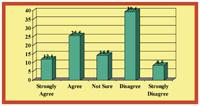 The
respondents of this survey slightly disagree that private schools provide a significantly
better educational experience. The chart shows a closely divided opinion with 37.6 percent
agreeing that students will receive a superior education in private schools while 47.5
percent disagreed with the statement. The data was also analyzed by several demographic
categories in an attempt to determine what factors may have influenced the respondent.
Gender was one of the demographic areas that was further analyzed to determine if a
significant difference existed between males and females when answering this question. The
following chart illustrates this comparison. The
respondents of this survey slightly disagree that private schools provide a significantly
better educational experience. The chart shows a closely divided opinion with 37.6 percent
agreeing that students will receive a superior education in private schools while 47.5
percent disagreed with the statement. The data was also analyzed by several demographic
categories in an attempt to determine what factors may have influenced the respondent.
Gender was one of the demographic areas that was further analyzed to determine if a
significant difference existed between males and females when answering this question. The
following chart illustrates this comparison.
Male Versus Female
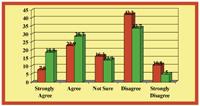 The chart
shows that males and females differ on the subject. The difference is significant at the
.001 level, with females being more supportive of public schools than males. These
findings also parallel my research findings on the value of the SOL tests, where females
were more skeptical of the tests’ ability to accurately measure a child’s
knowledge. The chart
shows that males and females differ on the subject. The difference is significant at the
.001 level, with females being more supportive of public schools than males. These
findings also parallel my research findings on the value of the SOL tests, where females
were more skeptical of the tests’ ability to accurately measure a child’s
knowledge.
A second demographic category attempted to answer the question: Does the educational
level of the respondent influence their support for either public or private schools? The
following chart shows the results of this survey when the information was analyzed using
college as the comparison factor.
College vs. Non-College
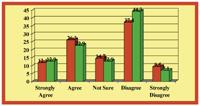 The
chart shows that little difference exists between the respondents when the data is
analyzed by the demographic category of college versus non-college. The statistical
analysis of the data also showed no significant difference existing between these groups. The
chart shows that little difference exists between the respondents when the data is
analyzed by the demographic category of college versus non-college. The statistical
analysis of the data also showed no significant difference existing between these groups.
Both parents and non-parents responded to the survey question. A comparison was done to
determine if parenthood influenced the respondent’s decision. The following chart
shows this comparison.
Parent vs. Non-Parent 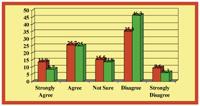 Again this chart shows only a small
difference in the way respondents answered the question when compared by the categories of
parent and non-parent. The statistical analysis also confirmed that no statistically
significant difference exists when the data is compared by parent/non-parent demographic
category. Again this chart shows only a small
difference in the way respondents answered the question when compared by the categories of
parent and non-parent. The statistical analysis also confirmed that no statistically
significant difference exists when the data is compared by parent/non-parent demographic
category.
| What�s Your View?
Obviously, there are at least two
sides to every issue. Do you have a different view? This column is
meant to provoke thought, so keep sending comments. Each one is read
with the utmost interest. Send e-mail to: [email protected], or send
written responses to the editor or to John Bonfadini, 7500
Forrester Lane, Manassas, VA 20109. |
Does their child’s present grade level influence their response to this research
question? The parents’ responses were categorized according to the grade level of
their youngest child — elementary, middle, or senior high. The following graphically
shows the responses by using the demographic category of the respondent’s youngest
child’s present grade level.
Child’s Educational LevelElementary -Middle-High School
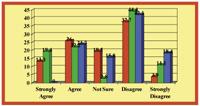 The chart shows a difference of opinion existing among parents with children in
different grade levels. To determine if a significant difference existed among the
categories, a one-way analysis of variance was performed. Significant difference was found
between the parents of elementary school children and those with children in senior high.
Parents of elementary school children are more supportive of private schools than parents
of senior high students. The chart shows a difference of opinion existing among parents with children in
different grade levels. To determine if a significant difference existed among the
categories, a one-way analysis of variance was performed. Significant difference was found
between the parents of elementary school children and those with children in senior high.
Parents of elementary school children are more supportive of private schools than parents
of senior high students.
Survey Conclusions
This survey respondent group sheds some light on the controversy existing between those
supporting private or public school education. You probably have your own opinion.
Certainly this limited survey shows the need to constantly monitor public opinion as
attempts to implement new teaching strategies or funding methods are discussed. Many other
studies have supported the findings of this study, showing that gender plays a significant
role in determining how the respondent will answer. This study also showed that experience
with the educational system has a role in forming conclusions. It appears that parents who
have children reaching the senior high level in public schools are more supportive of
public education when comparing it with private education. Factors such as the
respondent’s educational level or parental status did not significantly influence
responses.
Public Educators Can Be Cautiously Optimistic
My personal view is that both private and public schools play significant and different
roles in educating our society. Most students will always attend public schools, and
it’s nice to see that a majority of parents think highly of that educational
environment. But I caution public educators about being overly enthusiastic about the
results of this survey, since a third of the respondents think that their children would
receive a better education in private school. Improving the educational experience of
every child should be our goal. |